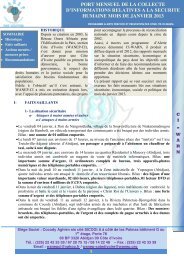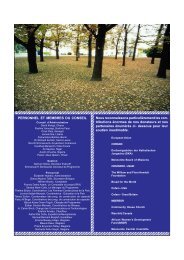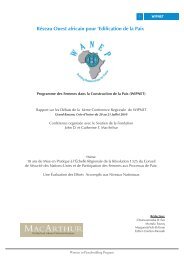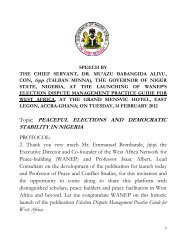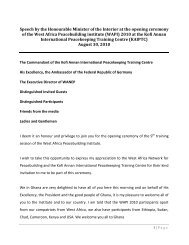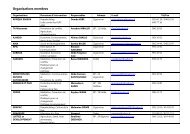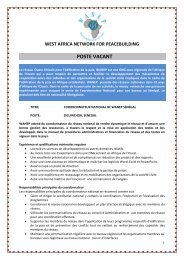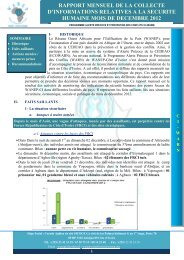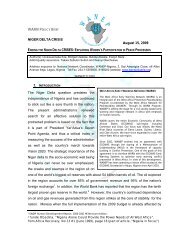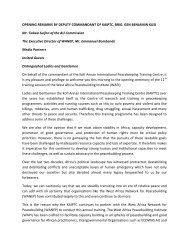DEVELOPMENT AND IMPLEMENTATION of National Action Plans ...
DEVELOPMENT AND IMPLEMENTATION of National Action Plans ...
DEVELOPMENT AND IMPLEMENTATION of National Action Plans ...
Create successful ePaper yourself
Turn your PDF publications into a flip-book with our unique Google optimized e-Paper software.
etween and among parties in a conflict. They play diverse roles – as healers andreconcilers, evacuation centre managers and relief operation coordinators. However,women <strong>of</strong>ten play these roles informally through un<strong>of</strong>ficial channels.••When women are actively involved, peace agreements are more credible and covera broader range <strong>of</strong> issues. Their participation widens negotiations beyond topics<strong>of</strong> military action, power, and wealth sharing, while promoting a non-competitivenegotiating style and building bridges among negotiating parties. Women negotiatorshelp establish positive relationships and steer talks away from zero-sum games overpolitical domination.••Research suggests that the presence <strong>of</strong> women civilian, police, and to a lesser degree,military peacekeepers does positively impact on the PSO and relations with localpopulations. In the few United Nations PSOs where women constituted significantproportions (30-50 percent) <strong>of</strong> the pr<strong>of</strong>essional posts, there have been increasedincorporation <strong>of</strong> gender perspectives into various aspects <strong>of</strong> the operation, and thishas produced positive perceptions from the local population which have impactedon the success <strong>of</strong> the operation. For example, local women, have been found to bemore comfortable approaching women peacekeepers, especially about issues <strong>of</strong> sexualassault, domestic violence, or in requesting assistance.••Women’s participation at the peace table is vital from a rights based perspective, becausewomen have the right to be involved in decisions which affect them and also becausebetter solutions will result based on the knowledge and skills and attitude womencan bring to the negotiating table (UNIFEM, 2005). Such roles, if recognized, sustained,strengthened and expanded can make a significant impact in the building <strong>of</strong> a culture <strong>of</strong>peace in larger areas <strong>of</strong> human interaction beyond the local community.••This suffering in war, the under-valued and under-utilized conflict prevention and peacebuilding work <strong>of</strong> women and the leadership they show in rebuilding war-torn societiesand their continued exclusion from positions <strong>of</strong> decision-making in the sphere <strong>of</strong> peaceand security resulted in many calls for women’s full and equal participation and gendermainstreaming in all peace and security initiatives with the resultant document UNSCR1325.••As a result, on October 31, 2000, United Nations Security Council Resolution 1325 wasunanimously adopted.••Since then four other complementary resolutions have been adopted – UNSCR 1820,1888, 1889 and 1960. These five resolutions are <strong>of</strong>ten referred to as the Women andPeace and Security Framework. They provide the basis for advocacy, education, reformand capacity building on gender equality and women’s rights as they relate to peaceoperations.••More than a decade after the adoption <strong>of</strong> UNSCR 1325, women’s participation in formalpeace negotiations still remains minimal; women’s specific needs in refugee campsand in disarmament and reintegration efforts are still largely un-met; sexual and otherforms <strong>of</strong> VAWG is still prevalent during and after armed conflict situations and the overallprogress on implementing UNSCR 1325 globally has remained slow and inconsistent.4



![English [266KB] - West Africa Network for Peacebuilding](https://img.yumpu.com/50460007/1/184x260/english-266kb-west-africa-network-for-peacebuilding.jpg?quality=85)
